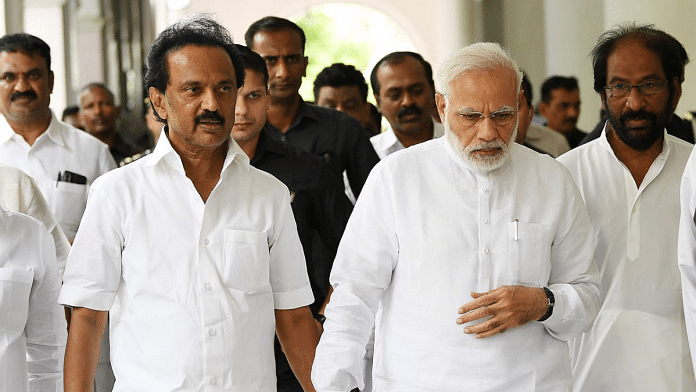Hindi down, down.”
“Don’t impose Hindi on Tamilians.”
This is what Tamil Nadu Chief Minister M.K. Stalin wrote in his long letter to Prime Minister Narendra Modi recently.
The provocation for the letter was the 11th report by the Committee of Parliament on Official Language, which is headed by Home Minister Amit Shah, submitted to President Droupadi Murmu on 9 October. The report recommended that the medium of instruction in technical and non-technical higher education institutes in India like the IITs (Indian Institute of Technology) in Hindi-speaking states should be Hindi and in other parts of India, their respective local language. Amit Shah also emphasised that local languages should be given preference over English in all states.
Why did the Dravida Munnetra Kazhagam (DMK) react so quickly? It has several internal reasons. The DMK hasn’t been fulfilling its promises and Tamil voters have developed a negative narrative towards Stalin’s failing administration. Foremost is dynasty politics. Stalin himself said that he was getting “sleepless nights” due to bickering among his party leaders. Re-elected as the party president during the DMK’s general council meeting on 9 October, Stalin has now chosen this platform to vent his feelings. Instead of directing a political charge against the Bharatiya Janata Party (BJP) and Hindutva, he went off another tangent. DMK allies were perplexed; leaders wondered — why such a “self-goal speech?” Why take an ‘aa bail mujhe maar’ position? Editorials and periodicals in major dailies hinted that Stalin is losing his grip on the party and government. Therefore, the parliamentary committee’s report came in handy — not wasting a minute, he hinted at the DMK’s 57-year-old slogan, “Down with Hindi”, which was its war cry in the 1965 anti-Hindi agitation in Tamil Nadu.
Today, with the parliamentary committee’s report, the DMK’s ‘anti-Hindi’ slogan has just gotten further impetus. Interestingly, the Official Language Committee consisted of all political parties, including the DMK and the All India Anna Dravida Munnetra Kazhagam (AIADMK).
A history of acceptance
The Official Language Committee is supposed to submit one report every five years. However, within the last three years, two reports have been submitted. It is under the discretion of the President of India to accept a report or dismiss it.
The committee was set up in 1976 under The Official Languages Act, 1963. It comprises 30 members of Parliament — 20 from the Lok Sabha and 10 from the Rajya Sabha. It reviews the progress made in the use of Hindi for official purposes and submits a report to the President, making recommendations.
More interestingly, former Home Minister P. Chidambaram, who was also the chairman of the committee in 2011, also presented a report that year to President Pranab Mukherjee with much more stringent paragraphs, which were implemented without resistance. Wasn’t the DMK a part of the United Progressive Alliance and Chidambaram Stalin’s best friend?
Currently, there are more than 12 volumes of the technical dictionary of Hindi. In 2017, President Mukherjee also accepted the committee’s recommendation for speeches to be delivered only in Hindi by all dignitaries. The Modi government decided to compile a dictionary of transliterated English-to-Hindi words and exclude difficult language in official correspondence. It was suggested that words like demonetisation, vimudrikaran (legal tender), note bandi — words that have entered popular parlance — could be accepted. Stalin also knows that the National Education Policy has certain inputs on similar use of Hindi in colleges.
On 16 October in Bhopal, Amit Shah released textbooks in Hindi for MBBS students as part of the Madhya Pradesh government’s project to impart medical education in the language. Tamil textbooks for MBBS students are also available in Tamil Nadu.
This is the age when cross-language communication is key to breaking barriers.
A Korean tourist in Mahabalipuram was able to transact in Tamil Nadu by ‘speaking’ Tamil with the help of Google Translate. Such is the progress in technology in the world.
Also read: KCR-Nitish, Kejriwal-Stalin—why north-south leaders are suddenly meeting each other
Archaic notions must go away
The DMK is still living in the 1965 era. “Hindi down, Hindi down” is redundant. Hindi as a political weapon has crossed its expiry date. DMK ministers may bicker that paani poori sellers in Tamil Nadu are North Indians. At the same time, there’s a large diversity of young people from Bihar, Uttar Pradesh, Jharkhand, and Odisha. Hindi has reached Tamil Nadu. The state’s social fabric now has an element of North India. It wouldn’t be surprising, if, in 2031, Tamil Nadu has a Bihari or a Uttarkhandi MLA or even a minister. In agriculture, textiles, automobiles, tourism, and hospitality sectors — North Indians have marked their presence in the state. The DMK must wake up to such realisations.
Stalin’s bogey of anti-Hindi agitation can be linked to one major fact — the DMK wants to categorise the BJP in Tamil Nadu as a Hindi and North Indian party. The DMK’s internal assessment is that the BJP in Tamil Nadu has grown, and in 2024, it may be a threat to Stalin’s stronghold.
The author tweets @RAJAGOPALAN1951. Views are personal.
(Edited by Humra Laeeq)



